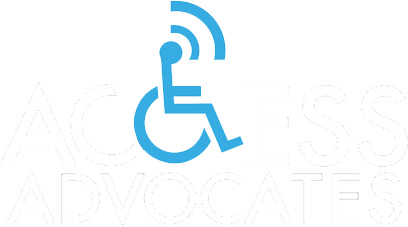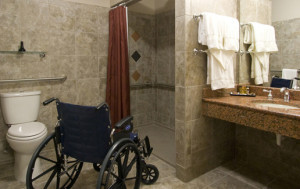As a hotel patron you know that a good customer experience means more business (read: revenue) for the hotels you visit. So why don’t more hotels make the investment to ensure their businesses are ADA-compliant? How do you encourage more hotels and lodging facilities to voluntarily make the ADA modifications? Here are a few tips.
First: Is the hotel subject to Title III of the ADA?
If the hotel, motel or inn is a public accommodation or a private entity and is a place of lodging then they need to comply with Title III of the ADA. The statute does not cover owner-occupied establishments renting five or fewer rooms.
Common hotel architectural modifications
Here are some of the most common architectural modifications hotels should consider. Examples include (but are not limited to) the following modifications:
- Creating service animal relief area
- Installing wheelchair access ramps
- Making cuts in sidewalks and entrances
- Repositioning shelves
- Rearranging tables, chairs, vending machines, display racks and other furniture
- Repositioning telephones
- Adding raised markings on elevator control buttons
- Installing flashing alarm lights
- Widening doors
- Installing offset hinges to widen doorways
- Eliminating a turnstile or providing an alternate accessible path
- Installing accessible door hardware
- Installing grab bars in toilet stalls
- Rearranging toilet partitions to increase maneuvering space
- Insulating lavatory pipes under sinks to prevent burns
- Installing a raised toilet seat
- Installing a full length bathroom mirror
- Repositioning the towel rack in a bathroom
- Creating designated accessible parking spaces
- Installing an accessible paper cup dispenser at an existing inaccessible water fountain
- Removing high pile, low density carpeting
- Keep in mind that although the government offers clear guidelines on how to make hotels, motels and inns more disability-friendly, it may be your suggestions as a customer that are the most important modifications.
Obviously, some of these modifications are easier for some hotels to make than others. Depending on the type and age of the building, owners may or may not need to do some or all of these modifications. Many hotels will need to consult a professional who can help them wade through the legislation, requirements and choices they’ll need to make as a business.
Access Advocates is here to help — contact us to learn how we can help you advocate for a hotel that is more ADA-compliant.
Image courtesy of Flickr, kcolwell

